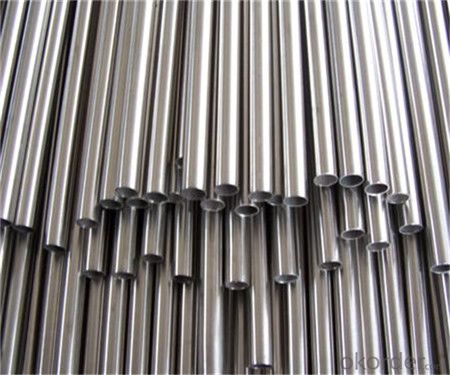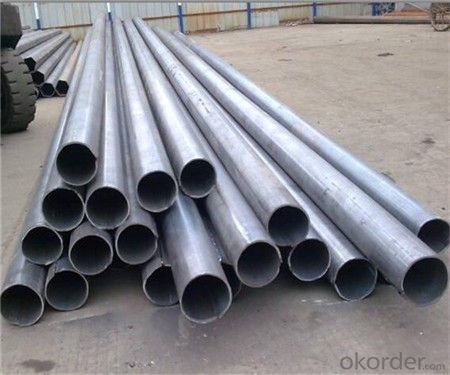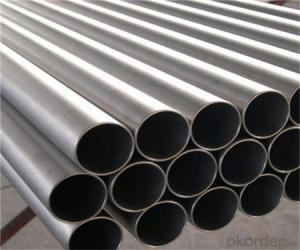China Professional Welded Steel Tube Steel Pipes manufacturer
- Loading Port:
- Tianjin
- Payment Terms:
- TT OR LC
- Min Order Qty:
- 25 m.t.
- Supply Capability:
- 9000 m.t./month
OKorder Service Pledge
OKorder Financial Service
You Might Also Like
● Full series of products provides an easier access for one stop purchase
▲ Line pipe
▲ Tubing and casing
▲ L & M & H boiler tube
▲ Gas cylinder tube & pipe
▲ Mechanical & Structural pipe
▲ Ship-building tube & pipe
▲ Automobile tube & pipe
Product Description:
1、Structure of Welded Steel Tube ASTM DIN1829:
Welded Steel Tube is formed by drawing a solid billet over a piercing rod to create the hollow shell. We are company that have many years experience and professional manager team and engineer team and sales team, sure we will provide you high quality of welded pipe and professioanl service.
2、Main Features of the Seamless Pipe ASTM DIN1829:
• High manufacturing accuracy
• The higher strength
• The small inertia resistance
• Strong heat dissipation ability
• Good visual effect
• Satisfy price
3、Seamless Pipe ASTM DIN1829 Specification:
Standard | GB, DIN, ASTM ASTM A106-2006, ASTM A53-2007 |
Grade | 10#-45#, 16Mn 10#, 20#, 45#, 16Mn |
Thickness | 8 - 33 mm |
Section Shape | Round |
Outer Diameter | 133 - 219 mm |
Place of Origin | Shandong, China (Mainland) |
Secondary Or Not | Non-secondary |
Application | Hydraulic Pipe |
Technique | Cold Drawn |
Certification | API |
Surface Treatment | factory state or painted black |
Special Pipe | API Pipe |
Alloy Or Not | Non-alloy |
Length | 5-12M |
Outer Diameter | 21.3-610mm |
Grade | 20#, 45#, Q345, API J55, API K55, API L80, API N80, API P110, A53B |
Standard | ASME, ASTM |
4、Packaging & Delivery
Packaging Details: | seaworthy package,bundles wrapped with strong steel strip |
Delivery Detail: | 15-30days after received 30%TT |
5、images of products:


FAQ of Welded Steel Tube Steel Pipes:
①Quality
Our products are manufactured strictly according to national and internaional standard, and before delivered out we always take a test
on every pipe . If necessary we could provide our quality certifications and all kinds of testing report,.
Guaranteed: If products’ quality don’t accord to discription as we give or the promise before you place order, we promise 100% refund.
②Price
we are factory and be able to give you lowest price below market one, and we have a policy that “ for saving time and absolutely honest business attitude, we quote as lowest as possible for any customer, and discount can be given according to quantity”,if you like bargain and factory price is not low enough as you think, just don’t waste your time.Please trust the quotation we would give you, it is professional one.
Why us?
We can provide both low price and good quality especially we are belong to national company could provide you the best sell-after service .Additionally, we can also offer professional products inquiry, products knowledge train(for agents), smooth goods delivery, exellent customer solution proposals.Our service formula: good quality+good price+good service=customer’s trust
Our Advantages:
1) Fast Delivery: lot of high quality steel pipe in stock lot of factory to produce
2) Quality Assured: Strictly acc. To International standard with System ISO certification
3) Good Service: supplied professional technical guide free of charge at anytime;
4) Reasonable Price: to be better support your business;
SGS test is available, customer inspection before shipping is welcome, third party inspection is no problem.
Looking forward to doing the corporation with you
Any question, kindly feel free to contact us !
- Q:How are steel pipes used in the manufacturing of wastewater treatment systems?
- Steel pipes are used in the manufacturing of wastewater treatment systems for various purposes such as carrying and transporting wastewater, providing structural support to the system, and facilitating the flow of water and chemicals throughout the treatment process.
- Q:Can steel pipes be used for conveying sewage and wastewater?
- Yes, steel pipes can be used for conveying sewage and wastewater. Steel pipes are commonly used in sewage and wastewater systems due to their durability and strength. They are resistant to corrosion and can withstand high pressure and flow rates. Additionally, steel pipes are able to handle the harsh chemicals and contaminants present in sewage and wastewater without deteriorating or affecting the quality of the conveyed fluids. However, it is important to ensure that the steel pipes are properly coated or lined to prevent any potential corrosion or contamination issues. Regular maintenance and inspections are also necessary to identify and address any potential issues that could arise in the system.
- Q:What are the different standards for steel pipes?
- There are several different standards for steel pipes that are used to ensure quality and compatibility in various applications. Some of the most commonly used standards include: 1. ASTM (American Society for Testing and Materials): ASTM standards are widely used in the United States and provide specifications for various types of steel pipes, including seamless and welded pipes. These standards cover dimensions, mechanical properties, and general requirements for steel pipes. 2. API (American Petroleum Institute): API standards are specifically designed for oil and gas industry applications. These standards provide guidelines for the manufacturing, testing, and inspection of steel pipes used in the oil and gas exploration, production, and transportation sectors. 3. DIN (Deutsches Institut für Normung): DIN standards are widely used in Europe and provide specifications for various steel pipe types, including seamless, welded, and cast iron pipes. These standards cover dimensions, materials, and technical delivery conditions for steel pipes used in various industries. 4. BS (British Standards): BS standards are widely used in the United Kingdom and cover specifications for steel pipes used in construction, engineering, and other applications. These standards provide guidelines for dimensions, materials, and manufacturing processes for steel pipes. 5. JIS (Japanese Industrial Standards): JIS standards are widely used in Japan and cover specifications for various steel pipe types, including seamless, welded, and cast iron pipes. These standards provide guidelines for dimensions, materials, and technical delivery conditions for steel pipes used in various industries. 6. ISO (International Organization for Standardization): ISO standards are recognized globally and provide specifications for steel pipes used in various industries. These standards cover dimensions, materials, testing, and quality control requirements for steel pipes. It is important to note that different industries and applications may have specific requirements, and therefore, it is essential to refer to the relevant standard for each specific use case. Adhering to these standards ensures the safety, reliability, and compatibility of steel pipes in their respective applications.
- Q:Are steel pipes suitable for desalination plants?
- Desalination plants can benefit greatly from the use of steel pipes. These pipes possess a variety of advantages that make them an ideal option for such facilities. Firstly, their resistance to corrosion is of utmost importance in desalination plants, where saltwater can be highly corrosive. The fact that steel pipes can withstand such corrosive conditions ensures the durability and longevity of the infrastructure, ultimately reducing maintenance and replacement expenses. Secondly, steel pipes exhibit remarkable strength, enabling them to withstand high-pressure situations commonly encountered in desalination plants. The ability of steel pipes to handle intense water flow without deformation or leakage guarantees the efficient and dependable operation of the desalination process. Moreover, steel pipes boast excellent heat resistance properties, rendering them suitable for desalination plants that engage in heat-intensive procedures like distillation or reverse osmosis. These pipes can endure high temperatures without suffering any structural damage, ensuring the secure and efficient transfer of heated water or steam. Furthermore, steel pipes are readily available and come in a wide range of sizes and specifications, allowing for flexibility in the design and construction of desalination plants. This availability and versatility make steel pipes a cost-effective choice for desalination projects. Overall, due to their resistance to corrosion, high strength, heat resistance, availability, and cost-effectiveness, steel pipes are highly suitable for desalination plants and are extensively used in the industry.
- Q:What are the safety precautions for handling steel pipes?
- To prevent accidents and minimize the risk of injury when dealing with steel pipes, it is crucial to implement various safety measures. Consider the following key safety precautions: 1. Personal Protective Equipment (PPE): Ensure that you wear suitable PPE, such as safety glasses, hard hats, steel-toed boots, and gloves. This will shield you from potential hazards, including falling objects, sharp edges, or chemical spills. 2. Proper Lifting Techniques: Employ correct lifting techniques to avoid strain or back injuries when lifting steel pipes. Bend your knees, maintain a straight back, and use your legs instead of your back to lift. Seek assistance or employ mechanical lifting equipment if the pipe is too heavy. 3. Secure Storage and Stacking: Organize the storage of steel pipes meticulously, ensuring that they are stacked and secured appropriately. Utilize suitable storage methods like racks or pallets to prevent pipes from rolling or falling. Avoid excessive stacking to maintain stability. 4. Inspect for Defects: Prior to handling steel pipes, examine them for defects like cracks, corrosion, or dents. Identifying and removing defective pipes is vital as they can pose serious safety risks. 5. Use Appropriate Handling Equipment: When moving or transporting steel pipes, make use of suitable equipment like forklifts, cranes, or hoists. Verify that the equipment is in good working condition and always adhere to the manufacturer's guidelines for safe operation. 6. Secure Transportation: When transporting steel pipes by vehicle, ensure that they are securely fastened to prevent shifting or falling during transit. Use restraints like straps or chains to secure the load. 7. Watch for Sharp Edges: Exercise caution when handling steel pipes as they may have sharp edges that can cause cuts or injuries. Wear gloves to protect your hands. 8. Communication and Training: Establish effective communication with your team members to ensure that everyone understands the correct handling procedures and safety precautions. Conduct training sessions on safe lifting techniques, equipment operation, and hazard identification. 9. Maintain a Clean Work Area: Keep the work area clean and free from debris, oil, or other slippery substances that may lead to slips or falls. 10. Follow Safety Guidelines: Always adhere to safety guidelines and procedures set by your organization or relevant regulatory authorities. These guidelines may include additional precautions specific to your work environment. By diligently following these safety precautions, you can significantly reduce the likelihood of accidents and injuries when handling steel pipes. Remember, prioritizing safety is paramount in any work environment.
- Q:What is the flexibility of steel pipes?
- Steel pipes possess exceptional flexibility, rendering them highly versatile and suitable for a wide array of applications. Their flexibility is derived from the inherent properties of steel, such as its high tensile strength and ductility, enabling them to bend and endure various forms of stress without breaking or deforming. The structural integrity of steel pipes remains intact even when bent or shaped into different forms. This facilitates simpler installation and routing around obstacles, making them more adaptable for intricate plumbing or piping systems. Furthermore, the flexibility of steel pipes allows them to withstand external forces like ground movements or temperature fluctuations without sustaining significant damage. Moreover, the flexibility of steel pipes makes them ideal for applications that involve dynamic movement or expansion. In the case of oil and gas pipelines or heating and cooling systems, where temperature variations can lead to expansion and contraction, steel pipes can accommodate these changes without causing leaks or failures. Additionally, the flexibility of steel pipes contributes to their durability and longevity. The ability to endure bending and stress prevents the formation of cracks or fractures that could result in leaks or structural failures. This characteristic establishes steel pipes as a dependable choice for demanding environments, including high-pressure systems or corrosive conditions. To sum up, the flexibility of steel pipes is a crucial attribute that allows for effortless installation, adaptability to diverse conditions, and long-term reliability. Due to their remarkable flexibility, steel pipes are extensively preferred in numerous industries and applications where strength, durability, and versatility are paramount.
- Q:What are the common materials used for pipe fittings in steel pipes?
- Pipe fittings in steel pipes can be made from various materials, including carbon steel, stainless steel, and alloy steel. Carbon steel fittings are popular due to their affordability, strength, and durability, making them suitable for applications in oil and gas, petrochemical, and water distribution systems. On the other hand, stainless steel fittings are highly resistant to corrosion and are commonly used in industries that prioritize hygiene, such as the food and beverage and pharmaceutical sectors. Alloy steel fittings, which consist of elements like chromium, nickel, and molybdenum, are designed to enhance strength and corrosion resistance, making them ideal for high-pressure and high-temperature environments like power plants and chemical facilities. Ultimately, the selection of pipe fitting material in steel pipes depends on the specific requirements of the application and the surrounding conditions.
- Q:What is an electric welded pipe (EFW)? Seek help!
- Pipe and pipe fittings should be suitable for the gap, usually with micro force insertion is appropriate, the gap is too large or too small will affect the quality of the interface.Check the depth of the plug and slip the spigot into the socket and position correctly.
- Q:How are steel pipes used in the construction of coal-fired power plants?
- Steel pipes are commonly used in the construction of coal-fired power plants for various purposes. They are utilized for transporting coal and other fuels, as well as for carrying water and steam in the power generation process. Steel pipes are also used in the construction of the plant's cooling system, helping to circulate water and dissipate heat. Additionally, they are employed in the construction of the plant's exhaust system, facilitating the removal of combustion byproducts. In summary, steel pipes play a crucial role in the infrastructure of coal-fired power plants, enabling efficient fuel transportation, heat exchange, and waste management.
- Q:What is ND steel pipe?
- ND steel 09CrCuSb steel is currently the most ideal "resistance to sulfuric acid dew point corrosion in steel (ND steel, ND steel, 09CrCuSb steel, 09CrCuSb steel), ND steel is widely used in the manufacture of economizer, served in the high sulfur content in flue gas of air preheater, evaporator and heat exchanger equipment for resist sulfur smoke gas dew point corrosion.
1. Manufacturer Overview |
|
|---|---|
| Location | |
| Year Established | |
| Annual Output Value | |
| Main Markets | |
| Company Certifications | |
2. Manufacturer Certificates |
|
|---|---|
| a) Certification Name | |
| Range | |
| Reference | |
| Validity Period | |
3. Manufacturer Capability |
|
|---|---|
| a)Trade Capacity | |
| Nearest Port | |
| Export Percentage | |
| No.of Employees in Trade Department | |
| Language Spoken: | |
| b)Factory Information | |
| Factory Size: | |
| No. of Production Lines | |
| Contract Manufacturing | |
| Product Price Range | |
Send your message to us
China Professional Welded Steel Tube Steel Pipes manufacturer
- Loading Port:
- Tianjin
- Payment Terms:
- TT OR LC
- Min Order Qty:
- 25 m.t.
- Supply Capability:
- 9000 m.t./month
OKorder Service Pledge
OKorder Financial Service
Similar products
New products
Hot products
Related keywords






























